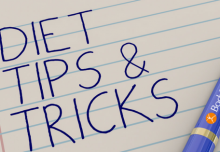Mindful Eating: Your Secret Weapon for More Effective Weight Loss.
Often we gain weight for reasons beyond just poor food choices alone. Destructive behaviors, negative thoughts or intense feelings can drive us to make poor food choices and overeat. No matter the driver, food should never be viewed as a source of comfort, stress relief, control, or escape. Indeed, it is essential to daily life, but food doesn’t have to be central to our daily life.
Mindful eating can be a powerful strategy to help gain control over unhealthy or destructive dietary habits. An increasing number of diet experts are now touting the benefits of mindful eating— not just to help you win your weight loss battle, but also to keep it off long term. To introduce you to the basic concepts of mindful eating, the team at BodyTech has compiled a list of easy to follow strategies. Consider adopting these strategies to help lose weight and better manage your eating habits.
1. Check Yourself
Ask yourself how hungry you really are—or if you are even hungry. Perhaps you’re bored, stressed or just compelled to eat out of habit. Each time you think you need to eat, ask yourself, “Am I really hungry? How hungry do I really feel?” If you aren’t really hungry, delay eating. If it’s really time to eat, aim to eat enough to become satisfied, but not so much that you feel overstuffed.
2. Take Measure
Gauge your hunger before taking action to eat. On a scale from 1 to 10, (1 being not really hungry, 10 being starving), ask yourself how hungry you really feel. By asking yourself this, you can better decide if it is truly time to eat or if you should wait. Awareness of your hunger level can help you make smarter choices about when and how much to eat.
3. Tune into Your Mood
Are you in a good mood, feeling stressed, or upset? Be aware of how mood can affect your desire to eat. Don’t allow your feelings to dictate your eating habits. Tune into yourself and separate feelings from your desire to eat.
4. Always Speak Positive
It’s all too common for us to speak about our weight, dieting and “being fat”, yet we don’t realize how it might affect those around us and ourselves. Avoid negative remarks that bring us down and those around us, too. Just because you might be overweight, doesn’t mean you are bad or should be discounted in some way. Commit yourself to a positive frame of mind, and it will work to uplift yourself and others— especially those who may also be struggling with their weight or self-image.
5. Eat without Distraction
Eating while distracted can lead to over indulging and gaining weight. Avoid any possible distractions that may leave you unaware that you are overeating. Avoid snacking while working, driving or watching a show. Sit at a dining table or somewhere quiet while eating. Again, focus solely on your meal, not work, television, your smartphone or anything that places you on “autopilot” while consuming food. Multitasking while eating is never a good idea. Commit to a more mindful focus when eating.
6. Be Present when Eating
Have you ever consumed an entire meal, yet afterward felt as though you hardly tasted it? Most of us do. While eating, it is important to bring all of your senses to the dining table. Eating should be a full-bodied experience and not one that is rushed. One great strategy to avoid overeating is to slow down and really focus on the food you are consuming. By doing this, you need to awaken all your senses and use them throughout the entire dining experience. Take a pause to look at the food you are about to eat, see how much there is on your plate, and understand that it is a good size serving. Smell your food before tasting it. Notice it’s aroma. Feel the texture of each bite of food, and chew slowly to more fully experience the flavor of each bite. Understand that you can enjoy food without inhaling it. Due to a heightened awareness of your meal, you will be less inclined to overeat.
7. Ask for Help
It is okay to ask for help. There’s nothing wrong with recognizing that you can’t tackle your mindset or eating challenges alone. There are plenty of excellent resources available to help guide and support as you work to develop better eating habits and behaviors. Consider contacting the diet coaches at BodyTech to discuss your needs.
There are many reasons that compel us to overeat or to eat foods that we shouldn’t. Adopting a more mindful way of eating—one in which you are completely present and in-the-moment—can help you better control what, when, how and the portion sizes you chose to consume. Start with small changes in your eating habits and stay committed to a more mindful approach to eating. You will be glad you did.







